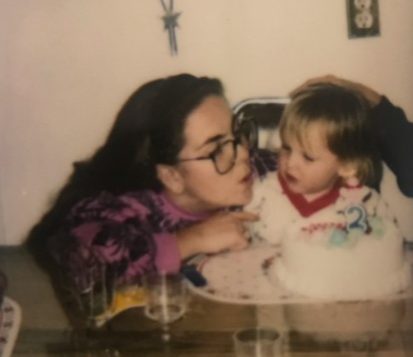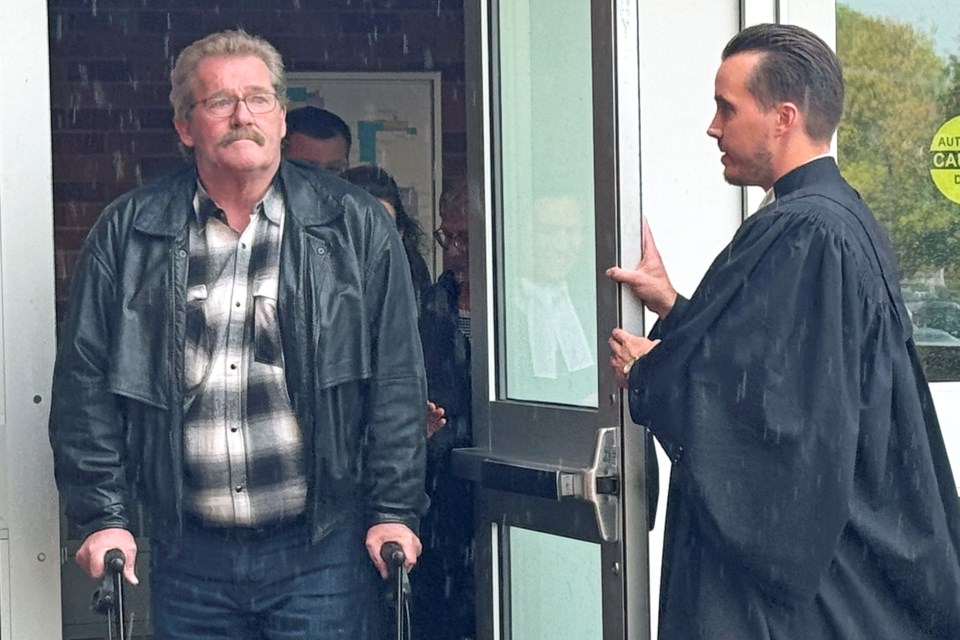Robert MacQueen left the Barrie courthouse today a free man following a five-week trial for second-degree murder.
“I am (free),” he replied to reporters as he slowly made his way to the Mulcaster Street parking lot with the aid of a walker to a waiting vehicle amid a light rain shower.
MacQueen, 61, was found not guilty Wednesday morning in the 1994 stabbing death of Katherine Janeiro in her Barrie apartment. He is also known as Bruce Ellis, a name which has also been used during the trial.
Janeiro, mother to a young daughter, was found dead on Oct. 10, 1994 in her Dunlop Street West home, near Anne Street.
The jury emerged today with their verdict after having been sequestered since late Monday afternoon as they deliberated on the 30-year-old case.
MacQueen, sitting at a table in the courtroom with his two defence lawyers on either side of him, listened intently as the jury foreperson passed the written verdict to Justice Clyde Smith at 11:25 a.m.
After Smith read out “not guilty” to the court, defence lawyer Mary Cremer hugged MacQueen as he showed little emotion to the verdict, other than a muted smile.
Janeiro’s daughter, Dawn Nelson, who was two years old at the time of her mother’s death, stormed out of the courtroom in tears immediately after hearing the verdict.

“I was two at the time of her murder, and it has been a lifetime that has been stolen from me and a lifetime that I will never be able to share with her,” she said in a written statement about an hour after the verdict.
“To all the investigators and the Crown Attorney’s Office, I am grateful for your hard work, but I am disappointed and distraught by the verdict.” she added.
MacQueen was asked outside the court shortly after being found not guilty of the charge, surrounded by two supporters and his defence team, what he would say to Janeiro’s daughter if he had the chance.
“I really don’t know what to say to Dawn. She’s been through a whole lot through her life, apparently,” he said. “Hopefully she gets some closure sometime, but it’s not going to come today.”
The trial began on Sept. 5. The jury began sequestering around 3:30 p.m. on Oct. 7.
Court heard the last time Janeiro had contact with anyone was around 4 a.m. on Oct. 10, 1994. Her body was discovered by a friend around 7 p.m. that night. Her daughter had been visiting family members at the time.
In their final arguments, the Crown listed some of the possible motives MacQueen may have had to kill Janeiro, such as spreading rumours that he had AIDS, her confronting MacQueen's wife about her being pregnant with his baby, and the phone which went missing and later found discarded in a nearby creek.
There was also a witness who identified him in 2019 as the man she saw running across Dunlop Street with the missing phone from Janeiro’s apartment 25 years earlier.
Janeiro was described during the trial as someone who lived a lifestyle that included characters who were involved with drugs, strip clubs and a notorious biker gang.
The Crown also leaned heavily on the blood evidence left by MacQueen in the apartment, saying “that’s his blood and her blood mixed in” on a door jamb near the bedroom, as they had insisted MacQueen brushed against the door frame as he carried Janeiro into the bedroom where she was eventually discovered.
In MacQueen’s defence, Cremer noted both biker gang leader William “Woody” Theakston's and Daigle’s extensive criminal records, and suggested Theakston, along with Daigle, who testified as a witness earlier in the trial, had “no respect to tell the truth here in court."
Cremer brushed aside the DNA evidence against MacQueen, insisting his blood was in Janeiro’s apartment because he had lived there for three or four months, and calling it “circumstantial evidence.”
“We are absolutely ecstatic with the results,” Cremer told BarrieToday in the courthouse hallway minutes after the verdict was handed down. “This has been a long journey for Mr. Ellis.
“This has been one very, very hard-working jury … in considering all of the evidence, and absolutely the right verdict was rendered in this case,” she added.




